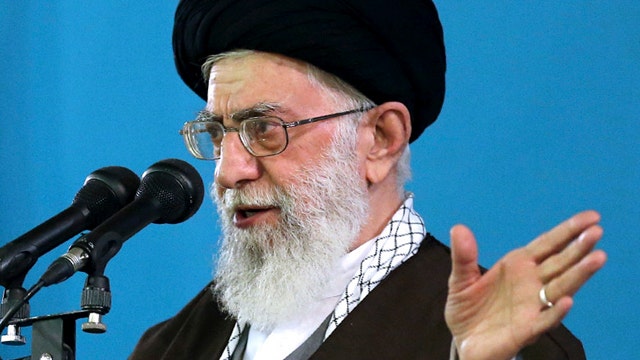Ayatollah warns Iran won't negotiate under military threat
Sen. Tom Cotton sounds off on nuclear talks with White House
Iran’s revolutionary court imposed harsh prison sentences last week on 18 Christian converts for charges including evangelism, propaganda against the regime, and creating house churches to practice their faith, according to sources with knowledge of the Islamic Republic's secretive judicial system.
“The cruelty of Iran's dictatorial leaders knows no limits."
The sentences totaled just shy of 24 years, according to a Persian-language report on the website of the U.S.-funded Radio Farda.The lack of transparency in Iran’s tightly censored and controlled judicial system did not allow for a breakdown of individual sentences. The defendants were also barred from organizing church home meetings and given a two-year ban from leaving Iran.
“The cruelty of Iran's dictatorial leaders knows no limits," Saba Farzan, the German-Iranian executive director of Foreign Policy Circle, a strategy think tank in Berlin, told FoxNews.com.
The Christians, many of whom were arrested in 2013, were sentenced in accordance with Article 500 of the Islamic Penal Code, a vague law used as a catch-all criminal statute to penalize threats to Iran’s clerical rulers. According to the law, “Anyone who engages in any type of propaganda against the Islamic Republic of Iran or in support of opposition groups and associations, shall be sentenced to three months to one year of imprisonment.”
Morad Mokhtari, an Iranian convert to Christianity who fled the Islamic Republic in 2006, told FoxNews.com on Monday that some of the Iranian Christians faced charges for their home church activities.
“Iranian religious authorities prefer that they [converts to Christianity] leave Iran because the authorities can’t control them," Mokhatari said. "Just their name is evangelism. Imagine someone says he is a Christian and has a Muslim name.”
Two independent 2015 reports —the United State Commission on International Religious Freedom and a UN study on human rights—documented intense persecution of Muslim converts to Christianity.
“Over the past year, there were numerous incidents of Iranian authorities raiding church services, threatening church members, and arresting and imprisoning worshipers and church leaders, particularly Evangelical Christian converts," read the commission report. "Since 2010, authorities arbitrarily arrested and detained more than 500 Christians throughout the country.”
The number of Christians in Iran is estimated at between 200,000 and 500,000,out of an overall population of nearly 78 million. Although the Islamic Republic’s constitution guarantees on paper that Christianity, Judaism, and Zoroastrianism are protected religions, the application of Sharia Law—or Islamic Law—relegates the members of the minority religions to second class citizens. The historical term for a subjugated non-Muslim religious minority member living in an Islamic society is dhimmi.
“The Iranian regime’s systematic persecution of Christians, as well as Baha’is, Sunni Muslims, dissenting Shi’a Muslims, and other religious minorities, is getting worse not better," said U.S. Senator Mark Kirk (R-Ill.) in a statement. "This is a direct consequence of President Obama’s decision to de-link demands for improvements in religious freedom and human rights in Iran from the nuclear negotiations.”
In response to multiple FoxNews.com media queries about the convicted Iranian Christians, Hamid Babaei, head of the press office in the Mission of the Islamic Republic of Iran to the United Nations in New York, declined to comment.
Farzan said the latest crackdown is further affirmation that the current talks between the U.S. and Iran on lifting economic sanctions in exchange for guarantees Iran won't pursue nuclear weapons cannot proceed in good faith.
"They never made sense and never will," Farzan said. "The West can't discuss arms control with a leadership that oppresses religious minorities and human rights activists.”
Benjamin Weinthal reports on human rights in the Middle East and is a fellow at the Foundation for Defense of Democracies. Follow Benjamin on Twitter@BenWeinthal

